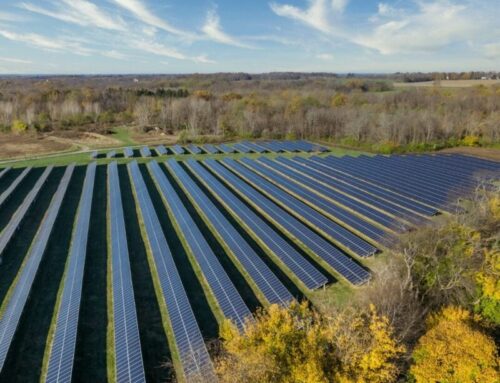Nigeria bets $410B on renewables; Zimbabwe maps AI future
October 26, 2025
|
Getting your Trinity Audio player ready… |
Nigeria has pledged to invest over $400 billion in renewable energy over the next three decades to power its digital transformation.
Speaking during the inaugural Nigerian Renewable Energy Innovation Forum (NREIF) 2025, Vice President Kashim Shettima unveiled the government’s bold plan to anchor its digital transformation ambitions on renewable energy.
In a separate event, the Director-General of the National Information Technology Development Agency, Kashifu Inuwa Abdullahi, identified clean energy as critical to the government’s digital inclusion plans.
“Renewable energy is not the destination. It is a catalyst. When there is power, connectivity follows, and that connectivity triggers true transformation,” Inuwa said in his speech at the International Monetary Fund (IMF) annual meeting in Washington.
For Nigeria, the digital future vision hinges on whether the government can expand digital initiatives beyond the urban areas and reach the vast majority of citizens living in rural areas. These are the people who need digital solutions the most, Inuwa says.
Additionally, it’s the population to whom these solutions make the biggest difference, he added. He cited examples such as economic empowerment from remote digital jobs for young Nigerians in rural areas and how farmers were using artificial intelligence (AI) tools to increase their yields.
Nearly half of Nigeria’s 220 million people live in rural areas. This population remains underserved, limiting its opportunities; some reports claim that only a third of rural homes have access to electricity.
A $410 billion clean energy vision
In his speech, VP Shettima outlined a bold vision by the Nigerian government to invest $410 billion in renewable energy by 2060.
“We are blessed with the minerals that power clean technologies, and Nigeria brings to the table youth, ambition, and untapped renewable potential. Let us seize this moment. Let us affirm that Nigeria is ready, ready to harness her resources, unlock her capital, and become the vibrant heartbeat of Africa’s renewable energy revolution,” he stated.
In the immediate future, Nigeria requires $23 billion to expand access to energy for the underserved, especially those living in poverty, the VP noted.
As a first step, the government has signed deals worth $435 million to deliver clean energy to its people. The deals were signed through the Rural Electrification Agency and dozens of private partners.
Days later, the country’s Energy Commission signed a deal with Chinese solar maker LONGi to build a local solar panel factory to support its renewable energy vision.
Nigeria is betting its future on digitalization. In 2019, former President Muhammadu Buhari unveiled the National Digital Economy Policy and Strategy, whose eight pillars include developing digital infrastructure, promoting digital services, and boosting indigenous content development.
In recent years, it has expanded this roadmap to include AI, which is expected to add $2.8 trillion to the African economy by 2030.
Zimbabwe unveils national AI strategy
Elsewhere, the government of Zimbabwe has unveiled the National Artificial Intelligence Strategy (2026–2030), a roadmap that will guide the country’s implementation of the technology while mitigating its risks.
The roadmap was announced by the Minister of Information, Jenfan Muswere, in the capital, Harare. He described it as the government’s “direct response to the need to properly harness the economic benefits and disruptive effects of AI in the era of emerging technologies.”
The minister explained that the strategy is built on three imperatives: transitioning Zimbabwe into a knowledge-based economy, boosting economic inclusion for the marginalized, and promoting Zimbabwean values.
“This strategy positions Zimbabwe to participate meaningfully in the global digital economy, ensuring that artificial intelligence serves as a force for development, inclusion, and resilience,” he told reporters in a media briefing.
Digital literacy will be critical in the achievement of the country’s AI targets, Muswere added. To this end, the government will conduct awareness campaigns nationally, culminating in a national competition for innovative AI applications.
“The Cabinet’s approval of the AI strategy signals a strong, top-down commitment to integrating AI into Zimbabwe’s national development agenda,” commented ICT Minister Tatenda Mavetera.
In order for artificial intelligence (AI) to work right within the law and thrive in the face of growing challenges, it needs to integrate an enterprise blockchain system that ensures data input quality and ownership—allowing it to keep data safe while also guaranteeing the immutability of data. Check out CoinGeek’s coverage on this emerging tech to learn more why Enterprise blockchain will be the backbone of AI.
Watch: Boosting financial inclusion in Africa with BSV blockchain
Search
RECENT PRESS RELEASES
Related Post






